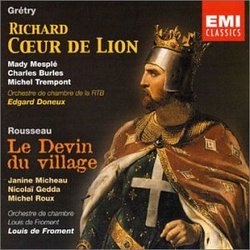| All Artists: Andre-Ernest-Modeste Gretry, Jean-Jacques Rousseau, Edgard Doneux, Louis de Froment Chamber Ensemble, Orchestre de Chambre de la Radio Télévision Belge, Charles Burles, Danielle Perriers, Jacqueline Sternotte, Janine Micheau, Jean Bussard, Jean van Gorp, Jules Bastin, Ludovic de San, Mady Mesplé, Michel Roux, Michel Trempont, Monique Bost, Nicolai Gedda, Nicole Dokens Title: Gr�try: Richard Coeur de Lion; Rousseau: Le Devin du village Members Wishing: 0 Total Copies: 0 Label: Angel Records Release Date: 10/21/2002 Album Type: Import Genre: Classical Styles: Opera & Classical Vocal, Historical Periods, Baroque (c.1600-1750), Classical (c.1770-1830), Modern, 20th, & 21st Century Number of Discs: 2 SwapaCD Credits: 2 UPC: 724357526623 |
Search - Andre-Ernest-Modeste Gretry, Jean-Jacques Rousseau, Edgard Doneux :: Gr�try: Richard Coeur de Lion; Rousseau: Le Devin du village
 | Andre-Ernest-Modeste Gretry, Jean-Jacques Rousseau, Edgard Doneux Gr�try: Richard Coeur de Lion; Rousseau: Le Devin du village Genre: Classical
|
Larger Image |
CD Details |
CD ReviewsA rococo bargain Kicek&Brys | USA/UK | 03/31/2003 (5 out of 5 stars) "Gretry's "Richard Coeur De Lion" (1784), a rousing tale about the rescue of the crusader king Richard the Lionheart by his faithful troubadour Blondel, is a minor masterpiece, the greatest French opera comique of the Ancien Regime. Gretry wasn't an eighteenth century composer of the calibre of Mozart, Rameau or his contemporary Gluck, but his music seduced audiences with its charm and tunefulness and in this opera he provided a great deal more. Blondel's stirring aria of loyalty to his king, "O Richard, oh mon roi", was so powerful it was used as an anthem by the royalists in the 1790s and promptly banned by the revolutionary authorities. The romance "Une fievre brulante" (which recurs throughout the opera in a very early anticipation of the Wagnerian leitmotif) is a superb melody too, sentimental in the best sense of the word. The only aria most people today are likely to be familiar with is "Je crains de lui parler la nuit", the song the old countess sings to herself just before she is murdered in Tchaikovsky's "Queen of Spades", but there are also lively peasant dances and choruses, catchy duets and trios and a barnstorming finale in which King Richard's loyal followers overrun the castle where he is being held and free him from its dungeon.This re-release of a Belgian recording from the 1970s finally gives us a chance to hear this delightful opera in a decent recording. You could make a few criticisms of the performance: Doneux is better conducting the forthright music, as he can be rhythmically unyielding in the more lyrical moments; as Blondel, Michel Trempont is occasionally gruff (but it could be argued this is not inappropriate to the role); the chorus could do with a bit more presence. But this is a vast improvement on the only previously available version, a rather rough and ready (if enthusiastic) live recording on Nuova Era.EMI have managed to squeeze the entire opera onto a single CD. They also give us a second disc containing another historically important French opera of the time, Jean-Jacques Rousseau's "Le Devin du Village" ("The Village Soothsayer"). Rousseau is deservedly more famous as a philosopher than as a musician and this isn't quite the musical treat Gretry's piece was, but it is an entertaining enough trifle. Louis de Froment with his soloists Nicolai Gedda and Janine Micheau give us the best recording we are ever likely to get of it in this mono version from the 1950s.With two discs offered for the price of one, this set is an almost absurdly generous bargain and there is really no need for French opera fans to hesitate." A delightful trifle Ralph Moore | Bishop's Stortford, UK | 11/21/2007 (4 out of 5 stars) "Gretry, a contemporary of Mozart (though he lived a lot longer), is one of a handful of famous Belgian composers (you can't really count the Flemish ones from long before Belgium was a country - especially as it looks as though poor old Belgium is falling apart again, now) and he has a stature in his honour in his home town of Lieges. This is a delightful piece; charming, tuneful and not inclined to take itself too seriously. If you are a French speaker you will enjoy the spoken interludes, performed with admirably clear diction, which link the musical numbers, but I could understand some listeners finding them somewhat missable. There are two or three still quite famous tunes, especially "O Richard, O mon roi", which I first heard sung by Sherrill Milnes (rather better than it is here, I'm afraid) years ago on a recital disc, and the doleful, nostalgic ditty sung by the old Countess in Tchaikovsky's "Pique Dame" ("Queen of Spades") just before she collapses and dies. The cast is wholly in genre and although Trempont's baritone is a bit grainy and strained up top, he sings very characterfully and with tremendous verve and gusto. It's really enjoyable - which is just as well, because the companion piece by Rousseau (who, on this evidence should have stuck to philosophising - though I sometimes doubt that, too...) is wholly negligible and, in truth, despite the promising looking cast, not really all that well sung. No; buy this at a bargain price, for the Gretry; it's a lovely period piece, lovingly performed by musicians who have this music in their blood."
|

 Track Listings (30) - Disc #1
Track Listings (30) - Disc #1